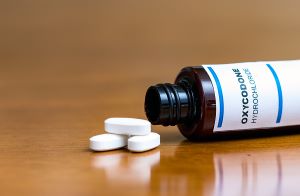August 23, 2022
by Patricia Tomasi
 A new study published in the American Society for Microbiology Journal looked at the long-term effects of developmental exposure to oxycodone on gut microbiota and the relationship to adult behaviors and metabolism.
A new study published in the American Society for Microbiology Journal looked at the long-term effects of developmental exposure to oxycodone on gut microbiota and the relationship to adult behaviors and metabolism.
“In this study, we sought to determine whether exposure of mouse moms to a widely prescribed and abuse opioid drug, oxycodone, would lead to longstanding effects on the bacteria in the gut and whether such changes might be associated with behavioral and metabolic alterations also seen in these adult sons and daughters,” study author Cheryl S. Rosenfeld told us. “We initiated these studies to determine whether this cause for concern that the infants currently being born to mothers who have been prescribed or abused such drugs might be at risk for various diseases as they mature.”
Such causation studies are unethical to do in humans and it will be several decades before the consequences on offspring health of pregnant mothers taking such drugs are known. The current rodent model offers an ideal option as they become sexually mature in six to eight weeks, and the gut microbiome and brain development are similar across rodents and humans.
“Our hypothesis was that developmental exposure to oxycodone through the mother would affect the gut microbiome into adulthood and such bacterial changes might be linked with behavioral and metabolic disorders observed in these same offspring,” Rosenfeld told us. We chose this topic as opioid abuse is considered one of the leading non-infectious public health disorders currently facing our country and others as well. It is personal for one of us as a family member was exposed during gestation to another drug (Quaaludes), that has severely compromised this individual’s health.”
To test their theory, researchers used a mouse model and treated the female mice during gestation to a dose of oxycodone that leads to comparable blood values as pregnant women prescribed this drug. Once the pups were born, they discontinued the treatments so that the offspring were only exposed during gestation. They then aged out the sons and daughters and tested their behavioral and metabolic profile at adulthood.
At this time, researchers also obtained fecal samples to use sequencing approach to examine bacteria within their gut, otherwise called gut microbiota. They then used bioinformatic computational tools that fellow author Dr. Trupti Joshi’s lab has perfected to link gut microbiota changes to behavioral and metabolic alterations also seen in these sons and daughters.
“Our finding reveal that developmental exposure to oxycodone can result in gut microbiota changes at adulthood that are linked with behavioral and metabolic alterations,” Dr. Joshi told us. “These effects are also sex-dependent.”
The researchers were surprised with the results.
“Developmental exposure to opioid drugs can lead to effects at birth, but we are one of the first groups to show that fetuses exposed to this drug can have longstanding effects into adulthood and that are likely not reversible,” Dr. Joshi told us. “Our findings raise cause for concern that pregnant mothers currently taking opioid drugs, in particular oxycodone, might be jeopardizing the health of their children, especially as they mature. These studies reveal the power of combining animal models and innovative computational tools to understand the health consequences opioid drugs might be having on the mother and her children.”
About the Author
 Patricia Tomasi
Patricia Tomasi
Patricia Tomasi is a mom, maternal mental health advocate, journalist, and speaker. She writes regularly for the Huffington Post Canada, focusing primarily on maternal mental health after suffering from severe postpartum anxiety twice. You can find her Huffington Post biography here. Patricia is also a Patient Expert Advisor for the North American-based, Maternal Mental Health Research Collective and is the founder of the online peer support group - Facebook Postpartum Depression & Anxiety Support Group - with over 1500 members worldwide. Blog: www.patriciatomasiblog.wordpress.com
Email: tomasi.patricia@gmail.com